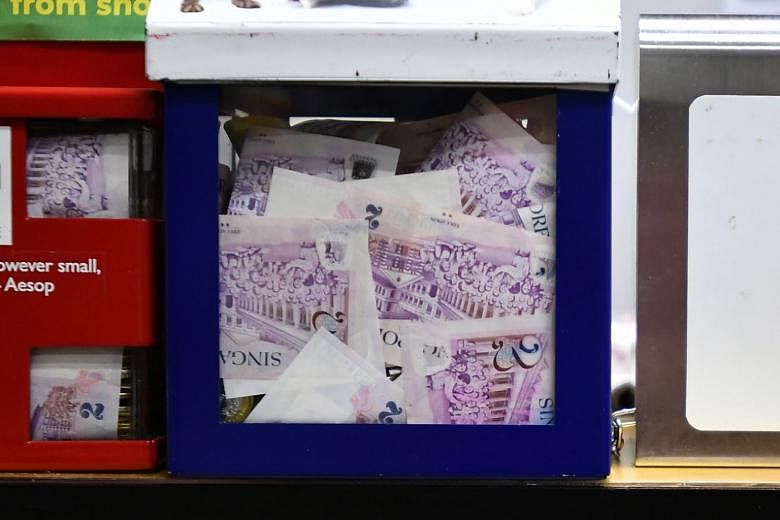SINGAPORE - With fewer than 10 staff, Realm of Tranquility, a charity that runs a Traditional Chinese Medicine clinic, has limited manpower and resources.
So it hired a commercial fund-raiser, freeing its staff to focus on running their services.
Last year, Envolve Collective sold bookmarks for $10 each on the streets for Realm of Tranquility. That raised more than $30,000 over three months and Envolve Collective received about 23 or 24 per cent of the sum raised as its fees, said Ms Rebecca Tan, Realm's immediate past president.
This year, Envolve Collective has been tasked to collect donations for Realm of Tranquility on the streets from January to April.
Then there is another small charity whose boss spoke off the record.
The commercial fund-raiser it hired collected about $3 million in donations a year for the charity in the past few years. He declined to reveal the fees paid.
He said: "On our own, there is no way we can raise this kind of money. We don't have the know-how. And without money, we can't go out to help people or expand."
The charity gets some complaints about the fund-raiser's practices, such as that they are "pushy", and around three donors a month ask for refunds, which are given by the charity. The fund-raiser gets donors to give through Giro or credit card deductions.
Such commercial fund-raisers, which are usually hired by small charities, came under the spotlight when the Commissioner of Charities (COC) released a comprehensive set of guidelines for them on Thursday (March 21) to bring about a "more trustworthy and safer giving environment".
The Code for Commercial Fund-raisers, which spells out their responsibilities and acceptable conduct, addresses concerns voiced by the donating public, namely their pushiness in asking for donations and their lack of transparency.
For example, the Code makes clear that under the law, it is mandatory for commercial fund-raisers to inform the donor of the charity it is raising funds for, the proportion of the proceeds that will go to the charity, and how the fund-raiser's remuneration is determined.
Fund-raisers are also told they should not "act manipulatively, dishonestly or deliberately make a potential donor feel guilty", or block the public's right of way in order to get them to donate.
The COC told The Straits Times that it gets an average of 25 complaints a year about all kinds of fund-raising events, and not only from appeals by commercial fund-raisers.
A spokesman added: "In recent months, the COC has received more feedback pertaining to wrongful representation or aggressive fund-raising behaviour by commercial fund-raisers."
There are fewer than 20 firms locally whose primary business focuses on commercial fund-raising, the COC said, but only SupportWorks Singapore has subscribed to the new Code.
SupportWorks Singapore, which used to be known as Appco Group Asia, said it has 70 contracted fund-raisers under its wing raising funds for charities here ranging from animal groups to environmental and health-related charities.
Those in the know say that commercial fund-raisers can be aggressive in getting donations as they earn a cut from the amount raised.
Often, these fund-raisers take up to 30 per cent of the donations raised or the maximum allowed under the law for fund-raising expenses.
Donors interviewed recount feeling harassed by commercial fund-raisers.
Ms Angelina Ong, 43, who worked in the marketing field, said: "As a frequent fund-raiser, I have donated all my life, but I have stopped giving donations to commercial fund-raisers. I feel harassed (by them)."
Calling the Code long overdue, she added: "If there is no transparency, how can there be trust?"
Housewife Yasmin Razak, 50, said of these fund-raisers: "Some of them do not let you go if you say you are not interested or they insist on asking for a minimum amount.
"Sometimes they don't want to share that they get a commission. It's only right that I know how much of my money is going to the charity and how much is going to them."
With the new Code in place, small charities interviewed say they feel more confident about hiring commercial fund-raisers.
Mr Nizar Mohamed Shariff, founder of Free Food for All, said: "Previously donors ended up blaming the charities instead of the commercial fund-raisers when they behaved poorly or are aggressive or pushy.
"This gives a very negative image of charities. With this Code in place, smaller charities will be more confident about working with commercial fund-raisers. Donors can also make a more informed decision."

